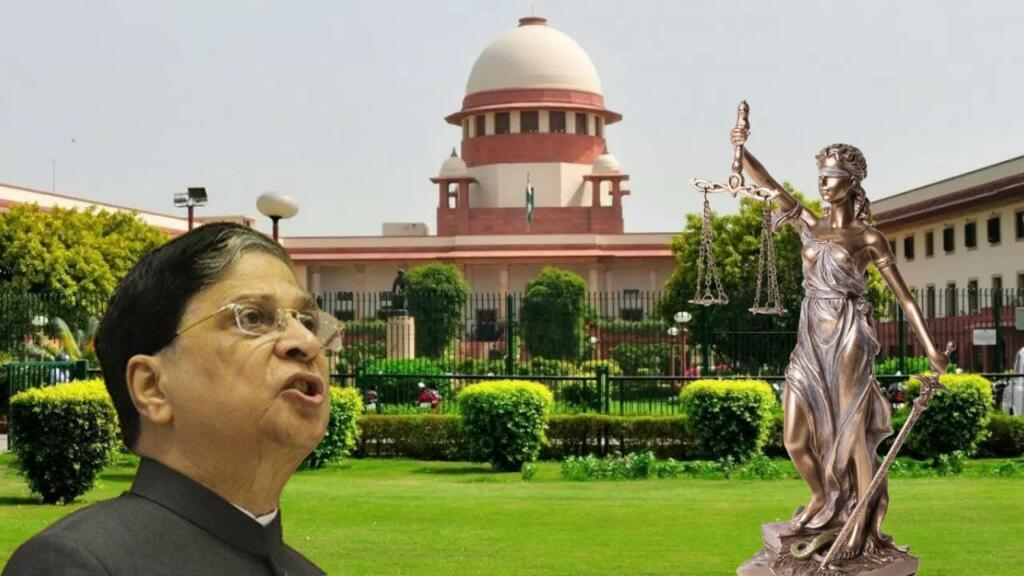The blindfolded Statue of Lady Justice holding a balance and a sword is always seen around the judicial architecture. The balance represents the scales of justice and the sword conveys the idea that justice can be swift and final.
The sword and balance are the actions of an impartial judicial procedure, which is represented by the blindfolded lady justice. It represents impartiality, the ideal that justice should be applied without regard to wealth, power, or status. The combination of these allegorical personifications of the moral force in judicial systems has helped the state sustain itself.
However, there are certain examples where the moral force of justice has been dented. Uday Umesh Lalit, the 49th Chief Justice of India, assumed office on 27 August 2022, hailing from a family with legal background.
His father U.R. Lalit was a former additional judge of the Bombay High Court and a senior counsel practising at the Supreme Court of India. The incident is linked to the present CJI’s father, U.R. Lalit, during a time when face value became the foundation of legal prudence.
Face Value Matters
In July 2016, an appeal related to a defamation case against Rahul Gandhi reached the Supreme Court, where Kapil Sibal represented the Congress leader and the opposition was represented by the Mumbai-based top criminal lawyer, U.R. Lalit.
The issue in the case involved the power of magistrates to ask the police to probe private criminal defamation complaints. The bench of Justices R F Nariman and Dipak Misra referred to the earlier verdicts of the Supreme Court, which challenged the constitutional validity of penal defamation law.
In the process of argument, the Court said that police cannot be asked to probe private defamation complaints. Responding to the bench, Mr U.R. Lalit countered that the proposition of law laid by the court is new and hence needs more discussion.
This counter-argument prompted Justice Misra, to ask, “Have you practiced criminal law?”
Senior advocate Kapil Sibal was shocked by the question. He retorted, “Lordship, he has practiced criminal law much more than us”. Justice Nariman, who also hails from Mumbai and knew about Mr U.R. Lalit too tried to pacify Justice Misra.
After learning about Mr Lalit, Justice Misra said, “Now, I will ask Sibal to sit down. Sorry, Sorry, you have never argued before me. So I didn’t recognize you”.
Advocate Lalit sarcastically replied, “Still, it is my fault. The man who comes occasionally to the Supreme Court should be ready for this”.
Justice Misra replied, ‘Sorry again. Now we would like to be educated by you on a particular point of law”.
Impartiality is The Core Virtue of Justice
Everyone except Justice Dipak Misra knew about U.R Lalit’s legal acumen. If a new and unknown face had asked such a question, the blindfolded lady of justice would have gone blind once more. Her impartiality would have been shattered in an instant.
Justice carries the virtue of impartiality, which states that the court is the custodian of the law and will uphold it regardless of wealth, power, or status. The sword of law would run in the balance of crime according to the impartial judicial virtue.
Impartiality runs in the core of the equality principle of law which is provided under Article 14 of the Indian Constitution. Not only the judicial system but the whole system of the state exists on the foundation of equality and impartiality. Discrimination on the basis of class, caste, region, religion, creed, sex, or other status has the capacity to disintegrate a peaceful society into pieces. Consequently, it is very important that the law abides by its work with a diligent impartial process.
Justice Misra questioning the legal acumen of U.R Lalit must be considered in the common functionality of the Court. The face value carrying significant weight in a court of law is dangerous for society. It not only affects the quality of judgment but also destroys the trust of common people in the judicial system. So, it is highly important that the three symbols the lady of justice carries are upheld in letter and spirit.
Support TFI:
Support us to strengthen the ‘Right’ ideology of cultural nationalism by purchasing the best quality garments from TFI-STORE.COM.
